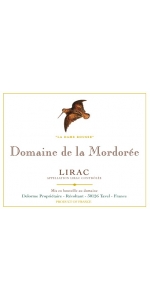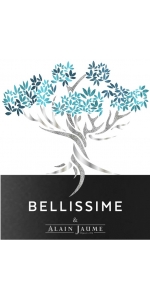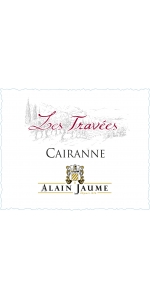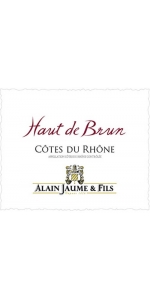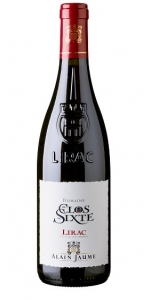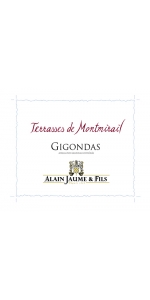Alain Jaume Saint Joseph La Butte d'Or 2018
6 bottles with free shipping for: $270.00
12 bottles with free shipping for: $456.00
| BUY MORE! SAVE MORE! | ||||||||||||||||||||
|
| Country: | France |
| Region: | Rhone |
| Winery: | Alain Jaume |
| Grape Type: | Syrah |
| Vintage: | 2018 |
| Bottle Size: | 750 ml |
Alain Jaume Saint Joseph La Butte d'Or is made from 100 percent Syrah.
The wine comes from vineyards that are sourced from the south of the appellation and located on hillsides that enjoy a east and southeast exposure. On the nose, this wine reveals aromas of pepper and jammy red fruits. In the mouth, it is balanced, ample and intense, offering beautiful tannins on the long lasting finish. A wine of character that can be cellared up to 8 years.
Manual harvest, selection of healthy and ripe grapes. Total destemming. Cold pre-fermentation maceration 5 to 6 days. Aged in oak barrels with 10% new oak.
Review:
"Opaque ruby. Aromas of ripe dark berries, licorice and candied flowers take on a smoky mineral aspect with aeration. Silky, fresh and round on the palate, offering sweet blueberry, cherry and spicecake flavors that open up slowly through the back half. Youthfully firm tannins add grip to a very long, smoke- and spice-tinged finish that strongly echoes the blue fruit and spice notes. (made with de-stemmed fruit and raised in oak barrels, 10% of them new) - Josh Raynolds"
- Antonio Galloni's Vinous (April 2020), 92 pts
The Alain Jaume Winery
Established in 1826 in the Northern part of Chateauneuf du Pape, the Alain Jaume Winery boasts both the exceptional terroir of the Southern Rhone Valley and a long line of dedicated winemakers. Alain Jaume works in accordance with certified organic agricultural practices for both the Grand Veneur and Clos de Sixte vineyards. They strive to let the true terrior be expressed in their wines.
The principal winemaker is Alain Jaume. His sons Sebastien and Christophe are both heavily involved with the winery in sales and marketing and winemaking respectively. The Alain Jaume winery consists of 40 acres in Chateauneuf du Pape, 50 acres in Lirac, and 75 acres of Cotes du Rhone vines. The family produces wines under two labels: Domaine Grand Veneur and Alain Jaume.
In 1320 Pope Jean XXII planted the first vines of Chateauneuf-du-Pape, but it was only in 1360 that the wines of the region first gained fame. Oddly, the wine that gave Chateauneuf-du-Pape its original reputation was the White and not the Red. The white wine was a favorite of Pope Innocent VI. The Domaine dates back to 1826, having been founded at that time by Mathieu Jaume. Since 1979, Alain Jaume has run the Domaine and now has the help of his two sons: Sebastien and Christophe.
"Popes throughout history have liked their juice, and when the papal see moved to Avignon in the 13th century, that juice was Chateauneuf-du-Pape ("the pope's new castle") made from grapes grown nearby in the Southern Rhône. The castle is a ruin now, the papal court long gone back to Rome, but the wines that bear the pope's coat of arms emblazoned on the bottle are still produced more or less according to the long-standing recipe. Not every winemaker uses all 13 of the grapes in the proscribed blend, though. At Domaine Grand Veneur, an estate that dates to 1826, Alain Jaume and his sons Sebastien and Christophe emphasize Grenache blended with Syrah and Mourvèdre."
- Los Angeles Times
"Improved Chateauneuf with very accomplished, stylish reds since the late 1990s; also very good Vacqueyras and Cotes-du-Rhône Villages." - Anthony Dias Blue's pocket guide to wine 2006
"Grand Veneur is one of the most brilliant estates in Chateauneuf du Pape as well as the force behind the negociant wines sold under the Alain Jaume label. Virtually everything they produce has merit. Some of this estate’s 2009 red wines are just hitting the market as they are bottled early to preserve their fruit and freshness. I can’t say enough about the job Alain Jaume’s two sons, Sebastian and Christophe, have done with this estate. The impeccable attention to detail in the vineyards, the meticulous vinification, and the careful bottling benefit every consumer." - Wine Advocate (#190, August 2010)
"Great bargains continue to emerge from Domaine Grand Veneur as well as from their negociant arm of the business, labeled Alain Jaume" - Wine Advocate (#195, June 2011)
"One of the best-run and highest quality estates of the Southern Rhone is Domaine Grand Veneur, now run by the younger generation of the Jaume family, Sebastien and Christophe. The brothers have done a fabulous job taking over for their quality-oriented father, Alain. These are their less expensive wines, but I will follow up later this year with my reviews of their 2010 Chateauneuf du Papes as well as the 2011s, which I have not yet tasted. They have certainly gotten a good start on their 2011 less expensive Cotes du Rhone selections. The Jaumes are some of the finest practitioners of white winemaking in the Southern Rhone and showcase that with their least expensive offerings, which are creative blends that over-deliver." - Wine Advocate (Issue #201, June 2012)
Some wines by Alain Jaume Winery:
- Alain Jaume, Ventoux, Les Gelinottes
- Alain Jaume, Côtes du Rhône Rouge, Haut de Brun
- Alain Jaume, Côtes du Rhône Villages, Rasteau, Les Valats
- Alain Jaume, Vacqueyras, Grande Garrigue
- Alain Jaume, Gigondas "Terrasses de Montmirail"
- Alain Jaume, Lirac Roquedon
- Alain Jaume, Châteauneuf-du-Pape Rouge, Vieux Terron
Any Alain Jaume wines we have in stock are listed below, if you don’t see the wine you are looking for please don’t hesitate to ask for it.
Mordoree Lirac Rouge Dame Rousse is made from 50% Grenache, 50% Syrah
Color: Deep Red
Nose : Red fruits (raspberry, black-current) and flowers (violet).
Palate : Full, rich and ample, long finish, nice concentration.
Aging potential : 7 to 9 years
Surface : 22 Ha. Yield : 40 Hl./Ha. Vineyard age : 40 years Terroir : Clay / chalk, clay / limestone and sandy with pebble stones. Harvest : by hand Vinification : 100% destemmed , long 30 days maceration with a maximum of 34°C temperature
Pairs well with red meats, grilled meats, game and cheeses.
Review:
A blend of Grenache, Syrah, and Mourvèdre brought up in tank, the 2019 Côtes Du Rhône La Dame Rousse is a big, rich, powerful Côtes du Rhône loaded with notions of smoked black cherries, licorice, scorched earth, and ample minerality. These all carry to a medium to full-bodied Southern Rhône that has terrific purity of fruit, ripe, present tannins, and a great finish. I love its balance and it’s going to deliver ample pleasure over the coming 4-6 years.
-Jeb Dunnuck 90-92 Points
"For this appellation this is a remarkably restrained and rather elegant red with complex red-fruit, baking-spice and terra-cotta aromas. The self-confidently dry tannins build gently and keep the alcohol well in check until right at the end, when you do feel a touch of warmth. A blend of grenache and syrah. From organically grown grapes. Drink or hold."
- James Suckling (February 2022), 92 pts
Alain Jaume Bellissime Cotes du Rhone Rose is made from 50% Grenache Noir, 25% Cinsault, 20% Syrah and 5% Mourvedre
Salmon-pink color, clear and brilliant. The nose is fruity and spicy, reminiscent of wild strawberry and fine Provencal spices. The palate is full, well-balanced and fruity, with a long, fresh finish. A beautiful and delicate rosé.
A part is drawn off the skins with short maceration and the other part is from direct press. Fermentation in stainless steel at cool temperature. Bottling 5 months after harvest.
Alain Jaume Bellissime Cotes du Rhone Rose is made from 50% Grenache Noir, 25% Cinsault, 20% Syrah and 5% Mourvedre
Salmon-pink color, clear and brilliant. The nose is fruity and spicy, reminiscent of wild strawberry and fine Provencal spices. The palate is full, well-balanced and fruity, with a long, fresh finish. A beautiful and delicate rosé.
A part is drawn off the skins with short maceration and the other part is from direct press. Fermentation in stainless steel at cool temperature. Bottling 5 months after harvest.
Alain Jaume Cairanne Les Travees is made from 65% Grenache, 35% Syrah, 5% Mourvèdre.
Our selected vines for this cuvée are on slopes facing south.
.
The wine delivers an intensive nose, with loads of black fruits.
Starting full and concentrated, with silky tannins, the mouth reveals blackcurrant and a cherry fruit typicity.
It finishes with typical notes of pepper and earth.
Enjoy with roasted lamb or braised or BBQed pork. gpoes also very well with mild cheese, such as brie or camenbert.
Alain Jaume Cotes Du Rhone Rouge Haut de Brun is made from 60% Grenache, 30% Syrah, 10% Cinsault
The colour is purple-tinged garnet.The aromatic range of the nose goes from fresh berries (wild raspberry, blackcurrant, blackberry) to spices.The palate is big and full-flavoured, with silky-smooth tannins and aromas of the fruit already mentioned. The finish introduces touches of liquorice and pepper. A Côtes du Rhône with great complexity for an every day drinking.
A classic Rhône to drink between 1 and 4 years. Best poured at 17°C.
Traditional wine making and ageing is performed in vats only. Bottling after 10-12 months.
Ideal throughout the meal, but particularly with poultry and other white meats, as well as mild cheeses.
Alain Jaume Domaine du Clos de Sixte Lirac is made from 50% Grenache, 35% Syrah, 15% Mourvedre
An intense red garnet color. On the nose, aromas of red and black ripe fruit (kirsch and wild blackberry). The mouth is full, with aromas of blackcurrant liqueur and spice. Tannins are both harmonious and elegant thanks to the fleshiness of the wine. Hints of licorice and vanilla on the finish, which gives the wine length and complexity.
Soil type LIRAC vineyard is facing Chateauneuf du Pape, opposite side of the Rhône river. As showed by the picture and following geologist George Truc, soils are almost similar in both side. They are marked by the violence wrought by the Rhone river. It consists of a layer of marine molasses of the Miocene period covered by alpine alluvium. The presence of a great number of rounded stones known as "galets" in the earth is evidence of the time when the Rhone, then a torrent, tore fragments of rock from the Alps and deposited them on the plain. LIRAC is one of the up-coming best area from the southern Rhône valley, as it delivers outstanding wines. Winemaking & ageing Traditional wine-making in stainless still vats. Hand sorted bunches, crushed and destemmed grapes. Fermentation temperature : 30°C. 18 days of vatting with pigeages.
Alain Jaume Gigondas Terrasses de Montmirail is made from 65% Grenache the rest Syrah, Mourvèdre by less than 15%.
Deep red garnet color. Aromas of ripe and black fruits. On the palate the wine is rich, powerful and harmonious - well balanced with wild berry and pepper dominating.
Soil types
Located in and around the famous area called “Dentelles de Montmirail”, the landscape typicity is made by a rocky bar (between 100 and 600 meters high). Soils are made of clay and sand with limestone. The “Dentelles” appeared thanks to the pressure between the Pyrenees and Alps mountains. This is a land of predilection to produce both powerful and fresh wines. Nights are cooler and the grapes ripeness usually comes in late September.
Winemaking & aging
Traditional wine-making in stainless and concrete vats. Crushed and destemmed grapes. Average of 18 days of vatting with pigeages. Ageing in vats mostly and oak barrels. Bottling after 12 – 14 months.
- back
Wolfberger Cremant d Alsace Rose Brut is 100 % Pinot Noir.
The wines from Alsace date back to 589 A.D., but Cremant d’Alsace has more recent beginnings, starting in 1900. Dopff au Moulin (founded in 1574) was the first to produce Cremant d’Alsace in the Method Champenoise style. Cremant d’Alsace received AOC status for sparkling wine in 1976. Two types of Cremant are produced today, resulting in about 2.5 million+ cases of Cremant d’Alsace production annually:
- Cremant d’Alsace, Brut – represents the majority of Cremant d' Alsace production. Uses Pinot Blanc, Pinot Gris, Pinot Noir, Riesling, Auxerrois, and Chardonnay.
- Cremant d’Alsace, Brut Rosé – much rarer, as it is 100% Pinot Noir only.
Wolfberger's Cremant d'Alsace Rose Brut displays a lovely delicate salmon color with active, small bubbles. Round and full-bodied, this Cremant Rose displays beautiful watermelon and strawberry aromas cascading in a smooth finish. A minimum of 15 months bottle aging before disgorging ensures ripeness.
This unoaked style of Viognier offers an accessible wine with enough body but without wood flavors.
The color is a brilliant green-gold and the style is dry but fruity. The perfume of a floral bouquet greets the nose and follows through with lovely tropical flavors in a light but lingering palate.
Free run juice was used. After settling and acid adjustment, it was inoculated with selected yeast. Fermentation temperature stayed between 13-14 degree Celsius. Wine was left on lees for few months prior to bottling to enhance the flavor. Alcohol: 13.82% Residual Sugar: 3.4 Total Acidity: 5.3 pH: 3.5
Slightly chilled. Lovely with most entrees - from crisp salads to creamy soups. Beautiful with chicken and fish - whether served grilled or in a creamy sauce.



